In recent days it has become clear that whilst building London’s new cross-rail project, archaeologists have found a mass underground burial. It is suspected that the remains of these people are the unfortunate victims of The Plague or Black Death as it is often known as.

Despite the rather stupid questioning from TV news presenters, it is obvious to anyone who knows history that this burial site is the resting place of some of the first plague victims in London. We can tell this by the orderly way the people have been buried. As the sheer scale of the plague overtook the land, later on plague victims would just be dumped in a large pit. There wasn’t enough time or manpower to do things properly.
The plague originated in Asia and came westwards towards Europe some say with the aid of The Mongols who are known to have used plague victims in the first real use of biological warfare by catapulting the bodies of plague victims over city walls knowing that the plague could kill the inhabitants more effectively than their feared soldiers ever could. Their large peaceful empire encouraged trade between China and Europe on the Silk Road with the plague reaching the city of Caffa on the Crimea in 1347. From there fleeing Italian merchants took the plague into Europe proper and whilst some quiet areas such as Belgium and parts of Germany and Poland largely remained unaffected, it was only ever going to be a matter of time before the plague reached England.
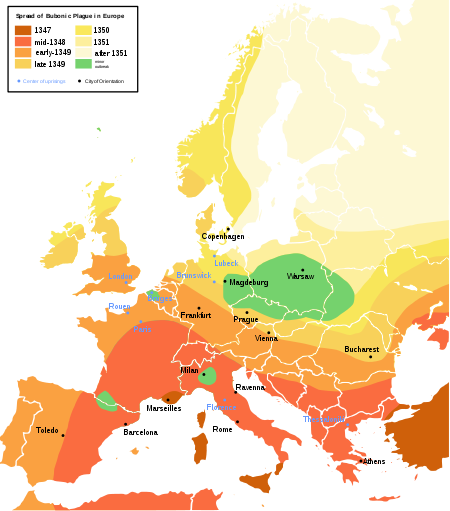
The fact that we had an idea there were plague burials in the recently excavated site and the fact they were well organised are just some of the indicators that England was as prepared as possible for the plague. Whilst obviously technically far inferior than what we are today, it is wrong to assume that the governments were stupid and at some level didn’t care about the welfare of their people. It was a good thing too as it is thought that the global population fell by 100 million people. The average death toll in Europe is thought to be about 50% although perhaps due to its dense cities and transport networks the population of England fell from 7 million to just over 2 million. Unlike in other countries law and order was maintained and there were no persecutions of ethnic or religious groups such as Jews who in other lands were linked and blamed for the Great Pestilence.
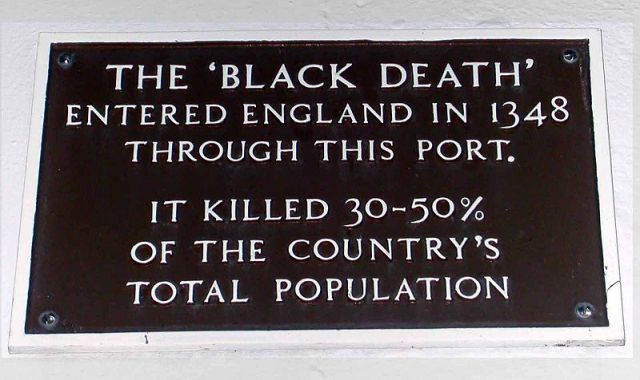
On June 24th 1348, a ship from Gascony in modern-day France arrived in Weymouth carrying a sick sailor. The first major city to fall was Bristol whilst the plague spread along three major roads towards the capital and by the autumn the plague had reached London and over the next 18 months spread northwards to ravage the whole country.
It is generally agreed that the plague bacteria was carried by fleas that lived on rats and the 70,000 people who lived in London narrow had no escape. Their houses were small with little or no ventilation and the streets were narrow with sewage flowing through them all of course a great breeding ground for rats.

Though the plague would have covered the entire country eventually, things were made worse when a plague ship docked on the Humber River several hundred miles northwards which allowed the plague to quickly reach cities like York. Recent famines and attacks by Scots left northern England particularly prone to the plague. Although the plague would kill people at all levels of society, as usual it was the poor who suffered worst with up to 90% of the peasants dying.
There was no cure for plague and once it was contracted, the person would know they had only a painful though quick death to look forward to. Things were made worse by the fact that there were multiple varieties of the plague with some being spread by air-borne virus as described in the childrens nursery rhyme below.
Ring-a-ring o’ roses,
A pocket full of posies,
A-tishoo! A-tishoo!
We all fall down.
There were attempts to treat sufferers, some were more or less nonsensical such as killing pigeons and rubbing the dead bird on the sores of the sufferers. Others had more potential validity such as forced sweating and vomiting of patients but their science was just inadequate for the task.
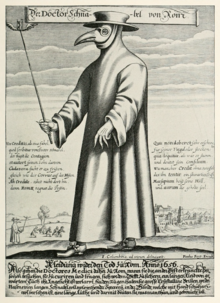
Plague Doctors were familiar sights partially as many legitimate doctors fled at the first site of plague as they knew it was hopeless. Being a plague doctor was a badly paid and terribly unpleasant job and not one for people who wanted a long life. Surprisingly they did wear clothing that offered some protection. Wax coats covered their body which would have been vaguely effective at protecting them although it is thought that the coats could carry the fleas from one house to another. They also were an unusual bird mask which has sweet-smelling materials in the beak. This may have been just to mask the awful smell but also may have protected the wearer from air-borne disease. Birds were also thought to be connected with the plague and it was hoped the disease would leave the sick to enter the bird. Plague doctors would also carry sticks to prod patients and dead bodies.
Any household who had a plague victim was quarantined with a red cross painted on the door. No-one except doctors and nurses were allowed in our out of the house for 40 days, a near death sentence for other family members. Unfortunate people were paid money to wander the streets shouting “bring out your dead” with dead victims dragged onto the cart and taken away to be buried in a plague pit.
A very few isolated villages escaped the plague. They would set exclusions zones through which no one could pass. Food and money were often left in pools of water in the hope it would stop any contamination. Of course all it needed was for a rat or flee to get in and the village would be doomed.
The Black Death wasn’t the first wave of plague as 40% of Europe was killed by it in the 7th Century and there were later outbreaks especially in India and China. Even in England tens of thousands of people would die in period outbreaks but the plague didn’t do well in the cold and the winter of 1349/50 did much to kill of the main outbreak.
It is often thought that the plague was beaten permanently in London after its outbreak in 1665 by The Great Fire of London in 1666 which destroyed almost all the houses and presumably a lot of the rats.
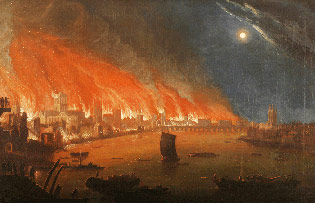
The Plague did inspire people to study the human body and medicine more as they were well aware of their shortcomings. The arts and culture suffered. It changed the way people in England spoke as virtually all the French speakers died. The country was hugely emptied of people. Imagine living in a street of 100 houses and within a month 70 of them were empty. That is what happened on a national scale. Many towns and villages just disappeared.
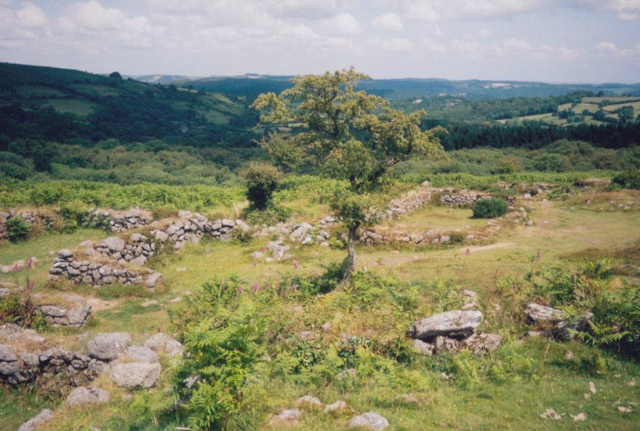
One positive aspect though was that the huge labour shortage meant that wages rose at this time at the quickest rate in history until the 20th C. It also ruined the feudal system of having serfs working on the land for their local lord and was one of the contributing factors to the famous Peasants Revolt with Wat Tyler in 1381.
**You may like to see the later post I wrote on my visit to The Plague Village of Eyam here**
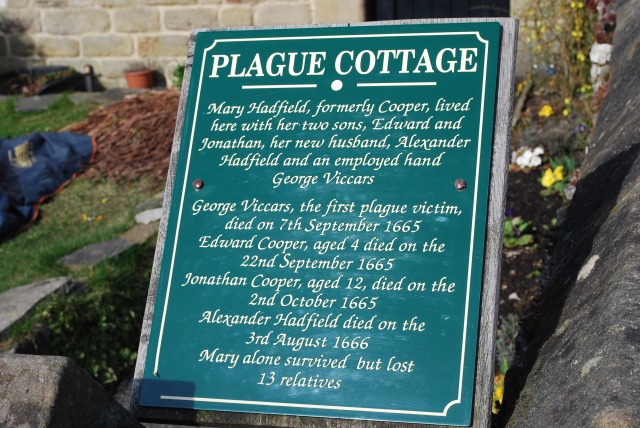
I love how you synthesized so much information into a not-too-long post. You gave just the highlights or the really fascinating parts. P.S. I have known that nursery rhyme my entire life, but never knew its origins. Makes total sense now.
LikeLike
Thanks Janine. I’m glad you liked it. I wonder how many parents teach their children this rhyme without knowing the meaning behind it. The fact we still sing it now 700 years later shows what a scar it must have left over the world. It must have been terrifying.
LikeLike
Yes, absolutely terrifying. When you described how they were buried, orderly at first, then in a hurried mass, my first thought was who was left to bury them and were they sick as well? Such a scary image.
LikeLike
I read this with great interest. Great post, thanks
LikeLike
Thank-you!
LikeLike
Great post.
LikeLike
Glad you liked it.
LikeLike
Interesting. I particularly like the way you have illustrated the text. As The Picture Post discovered pictures can inform us memorably.. I hadn’t seen the underground map or the abandoned village before. Thanks!
LikeLike
I’m glad you liked it. I thought it was a good way to tie in the Plague with some current news.
LikeLike
I’m glad you liked the pictures too. I always like to find suitable photos. That plague doctor image has always seemed nearly as scary to me as the plague.
LikeLike
I loved reading this. It was a well constructed post.
LikeLike
I’m so glad that you enjoyed it. Thank-you for stopping by my blog.
LikeLike
The plague and the great fire of London are connected.

http://www.historyworld.net/wrldhis/PlainTextHistories.asp?ParagraphID=ilz
An example of the urge to identify scapegoats for the fire is the acceptance of the confession of a simple-minded French watchmaker, Robert Hubert, who claimed he was an agent of the Pope and had started the Great Fire in Westminster.[53] He later changed his story to say that he had started the fire at the bakery in Pudding Lane. Hubert was convicted, despite some misgivings about his fitness to plead, and hanged at Tyburn on 28 September 1666. After his death, it became apparent that he had not arrived in London until two days after the fire started.[54] These allegations that Catholics had started the fire were exploited as powerful political propaganda by opponents of pro-Catholic Charles II’s court, mostly during the Popish Plot and the exclusion crisis later in his reign.(from wiki http://en.wikipedia.org/wiki/Great_Fire_of_London)
http://www.bugbog.com/gallery/london_pictures/london-the-city.html
The after math of the fire, led to the rise of a super power based in city of London. Any chance of a Conspiracy??!!
LikeLike
Thank-you for your great comment. I was aware that there were false allegations that the fire was started by “foreigners” but did not know about Hubert actually arriving in London after the fire.
I am going to check out your links as I’m sure many others will. Nothing surprises me about London or its history so I am sure there is every chance of a Conspiracy even if we don’t know of it at the moment!!
LikeLike
Thanks for the reply, your openness towards truth is welcome. All the best!
LikeLike
Such an interesting history. Thank you for researching and posting.
LikeLike
You’re welcome, I’m glad that you liked it.
LikeLike
Thanks so much for this informative post! I just re-read Camus’ The Plague and your information about role of the plague doctor, who is the central character in that book, was fascinating background information.
LikeLike
I have not read that book you mention but I can see it would be of interest to me. I’m glad you liked my post, thanks for your comment and the tip of for my next book buy!
LikeLike
Very interesting! I always learn something new from your posts.
LikeLike
Many thanks!
LikeLike
It changed the way people in England spoke as virtually all the French speakers died.
I found this part particularly interesting, not only because of the irreversible change to the native tongue, but also because it made me wonder if French speakers–people with bloodlines tied to the continent, anyway–were genetically more susceptible to the plague.
This entire piece is really interesting. I completely agree with Janine’s assessment…that’s a lot of information in such a small piece. I’m curious if, today, we would be able to keep such order. Governments develop plans for handling such disasters, but as people become too sick to carry out the plans (particularly in a day and age where we believe everything can be treated with a bottle of pills), I am not so sure those remaining could hold it together.
LikeLike
I’m not sure if the French speakers more genetically more pre-disposed to suffering from the plague but perhaps the ruling elites had bigger problems to worry about with no-one left to work in their fields than learning French.
Even though the wages for the peasants increased, I read that the population and economy generally took over a century to return to anything like it was before. Perhaps also French speakers decided to stay in France afterwards given that their country was suffering equally bad in its own way.
I’m not sure we would cope either as you say. I know in modern times if there is war like the bombings of Britain in WW2 or the floods New Orleans, people do come together a lot more. Presumably the people who carried and buried the dead were at the bottom of society and yet they still did as they were told as it was their duty and also perhaps it was the only way they could continue living their lives but people these days panic buy just to get fuel for their cars or supermarket sales. I know lots of us would still die for our friends and family and maybe our country but would we condemn our selves to almost certain death just because of our ranking in society? I don’t think so.
A really good and though-provoking comment. Thank-you.
LikeLike
Great job! Really interesting. It reminds me of a book I read recently by Connie Willis, the Doomsday Book. She imagines what it might have been like to live during the plague outbreak and incorporates many interesting historical facts as well.
LikeLike
Thank-you. I remember reading that book about 10 years ago. It is a really good read. Have you also read Canticle for Leibowitz? If not, I recommend it.
LikeLike
I have not. Thanks for the suggestion!
LikeLike
Thanks for visiting and liking my post. This is really a great article. I’ve been to London twice now and the rest of England once and it is definitely one of my favourites!
LikeLike
You’re welcome. I’m glad you liked my post and England. So much better since we got rid of that pesky Black Death!
LikeLike
Stephen, thanks so much for posting. Interesting subject. I love thought provoking reads, especially about history. I couldn’t help thinking that I hope those workers are wearing masks while digging. Imagine if some of those germs lived on……
LikeLike
You’re welcome. Yes it is so easy to make history interesting and even exciting so it’s to see why it often has a boring reputation. I was wondering the same thing, I have seen that they do have masks on but nothing more than that. I did a little more research and they are very confident that the plague couldn’t survive in those conditions although I have heard that other grave areas where people have died from other horrid diseases are treated a bit more carefully.
I always think of the head of the Egyptian Antiquities who when he opens up a new tomb for the first time, lets it air for 2 days before he goes in which seems a good idea to me.
LikeLike
Yes, I read that too. It makes since, there are some wicked mold and mildew spores that I wouldn’t want to breath in!
I wanted to let you know that I found your post so intriguing that I went over to Amazon and looked at your book. Thanks for letting it go to Kindle, not everyone does. I bought it, but can’t start until I’m done with “Londoners” by Craig Taylor. Looking forward to it.
Linda
LikeLike
Oh thank-you Linda. I really appreciate that. I do hope you enjoy it. There are so many book formats and so many territories these days it is hard to remember where to have books registered but I have actually sold a few in Kindle recently. Do let me know how you like it. I am actually just finishing book 2 this week! -Stephen
LikeLike
Fantastic post! The Plague has always interested me (does that make me morbid? lol) and I appreciate your quick presentation, here. And your learned audience, too. 🙂
LikeLike
Thanks Sandi. I think the overwhelming awfulness and size of the plague makes it popular with lots of people who wouldn’t want to know about smaller more recent outbreaks of illness.
Yes there is a very learned audience here. Great minds obviously think alike 🙂
LikeLike
Reblogged this on Mighty Mikey's Mega Blog.
LikeLike
Although i am not a fan of history but the post is really informative… Great post 🙂
LikeLike
I’m glad you liked it. It’s hard to make the Black Death interesting though, nothing to do with my writing talents or lack thereof 🙂
LikeLike
😉 😛
LikeLike
Some say it originated here in Kyrgyzstan, on the shore of Issyk Kul but the population density was not such to allow it to do more than cause localized outbreaks.
LikeLike
That’s interesting as I read that the reason it spread so quickly without staying in any one place for too long was that it killed so many hosts that there quickly wasn’t enough people left for it to flourish after the initial epidemic.
Thanks for your comment.
LikeLike
Excellent piece Stephen. It is crazy to think of the devastation that The Black Death caused and the way in which it shaped Europe.
LikeLike
If we think we have overpopulation now, it would have been so much worse if our starting point 600 years ago was 2 or 3 times higher. I wonder maybe if things like the Renaissance and the Industrial Revolution might have happened earlier if humanity hadn’t been set back that way.
LikeLike
Yeah, that is the interesting thing. From the horror of the time society was nearly forced into developing a certain way. The change in serfdom, particularly in England, helped shape the revolutions to come. With the decline in spoken French in England it paved the way for the English language to become one of the great languages of literature.
LikeLike
What you say is true, perhaps along with the Norman Conquest, the plague was the single biggest change in British history. We could all have been reading and writing on WordPress in French. Perhaps writers such as Shakespeare may never have been as gifted in French or even able to write in French at all. Did having a prosperous English language help give King Henry VIII the confidence to abandon Catholicism and create a new religion? It must have changed things in thousands of ways which we will never know.
LikeLike
Great post, thank you! Caught me up on some important history! 🙂
LikeLike
Glad to be of service 🙂
LikeLike
I like…..Your post that is, not the plague.
LikeLike
Thanks, there is no doubt my worst post is better than any aspect of the plague!
LikeLike
Hey Stephen. You have some really great content on here….i was reading your post on the plague aka the black death and i just cant fathom how deadly that was. To think of being in the medical field back then during that time is horrific! however whats even more horrific is the thought of the doctors who did have the courage to stay and the motivation to try and comfort people dieing while doing probably one of the most unappreciative jobs in the history of the world! Doctors deserve more recognition and especially nurses…..most work harder than the doctors do…i would know because my mother raised two kids by herself while working 15 hours a day 6 days a week in ICU. Your post sparked an idea and i wanted to ask perhaps if you maybe wanted to help me write it. I Was thinking of doing a piece on the medical industry today and how doctors and nurses and care givers don’t get enough credit or recognition for the miracles they perform each day and try and decipher why that is and what needs to be done to establish recognition for doctors who go to college for 8 plus years and then they work over 20 hours a day somehow and only have a day off every couple of months and for nurses who take such good care of there patients while doing equally remarkable and courageous things at home.
I am still trying to piece together my thoughts on it but its just an idea i had. Regardless i love your blog and you have a new subscriber for life! -sorry for writing a book on your blog-
LikeLike
Thanks for your great comment. Sorry for taking so long to reply but you may have read I had lots of things happening this week.
I agree, I can’t think of a worse job. The only parallel maybe are those people who go into a nuclear reactor after radiation leaks and are risking premature death but still it doesn’t really come close given the awful conditions the old doctors worked in.
You’re right about the nurses. No disrespect to Doctors but nurses do one hell of a job and for a fraction of the pay. God bless them all. I often think how much better the world would be if nurses and rubbish/garbage men got paid the huge salaries instead of bankers and businessmen as they do the jobs we all need to have done but probably wouldn’t want to do ourselves. Looking after elderly patients with dementia or long term problems must be awful.
I would very much like to co-write something with you on this.
I’m really glad you like my blog!
LikeLike
Great post.
The plague is not as distant as we may think. My grandmother had vivid recollections of the Great Flu epidemic of 1918-19 and vividly remembered young people taken to the cemetery daily. She was six at the time.
Today, something similar is happening in HIV-stricken Africa, where many areas have lost nearly all their young adults to the disease, leaving just the children and the elderly.
LikeLike
Thanks. You’re right of course. HIV in parts of Africa is every bit has awful as the Plague was except perhaps the sufferer survives for longer.
I read of some one in Oregon, USA contracting The Plague in 2012 after being attacked by a wild animal.
LikeLike
!
Did he/she survive it? I suppose there are antibiotics for it, aren’t there?
LikeLike
I believe he survived as he gained medical treatment very early on. I have copied in a report below but just look at his hands to see how awful this plague must have been hundreds of years ago.
http://www.guardian.co.uk/world/2012/jul/18/oregon-man-case-plague
LikeLike
Incredible! Thanks for the link.
LikeLike
Wow! I need to read more about this! So interesting!
LikeLike
I’m glad you liked it. There is a load of material on the internet and good history and historical fiction on the subject too.
LikeLike
I hadn’t even heard about these graves being found. Richard’s bones in the carpark were all over the news, but of course no one in the international media gives a damn about some poor dead peasants, even hundreds of years later. Sad.
LikeLike
Some things never change. I always think how wrong it is that in history, large memorials were built to officers and leaders who usually didn’t suffer anything like as much as the nameless people who died under their command and unlike the officer had little choice in fighting anyway.
LikeLike
This is fantastic – I’ve always been interested in the plague and great fire – I’ve been really disappointed with the information provided on the news since the bodies were discovered. I’m really interested to see if they can discover what the disease actually was, but meanwhile your information has provided a great insight that I wasn’t taught at school when we covered this subject, so thank you.
LikeLike
I’m so glad that you liked my blog. That’s awful that you didn’t learn this at school. It is just the sort of horrible thing that many children would love to learn.
Apparently they are going to attempt to remove genetic material to find out more about the plague and these people who died. They even hope to identify some of the bodies as these early plague burials were quite well documented at the time.
LikeLike
Interesting post. I read Defoe’s ‘diary of the plague year’ while walking around central London… really creepy! Discovered St Olafs (http://en.wikipedia.org/wiki/St_Olave_Hart_Street) where you walk down into the church as the ground is built up by the plague pit. Love the skull and cross bones over the church door!
LikeLike
Oh thanks for your comment Alexander. I had heard of St Olafs but have never visited it an wasn’t aware of the plague pit. I think that will make for an interesting diversion one day!
LikeLike
Fascinating post! I recently read about a couple who contracted the plague in New Mexico. They were thought to be terrorists at first: http://www.npr.org/2013/03/22/174963598/living-and-loving-through-the-bubonic-plague
I also love Connie Willis’s Dooms Day Book, and highly recommend Geraldine Brooks, Year of Wonders about an English village during the 1665-1666 plague. It’s a novel based on historical events–beautiful and sad.
LikeLike
Thanks for that and the link. I read about a plague case in Oregon in 2012.
I’m glad you also like Dooms Day Book but I haven’t come across Year of Wonders. I will definitely get it on your recommendation 🙂
LikeLike
I hope you enjoy it! She has written several excellent historical novels.
LikeLike
It is perhaps a little bit ironic as much as sad that so many dead, in the end, resulted in so many others being able to finally earn a living – as the landed gentry were forced to offer something beyond food, clothing and shelter in competing with each other for labour to work the land as well as skilled services.
As you know from seeing my blog on “The Return to Canterbury”, I believe this is what afforded a new class of people to be able to have freedom to take to the road and think about life beyond their daily toil – and is what led Geoffrey Chaucer to note this and write about them in his book “The Canterbury Tales”. Without this we would not have had the more balanced and educated society that we have today.
P.S. The people involved in “The Peasant’s Revolt” were not exactly “peasants” – despite history (or perhaps, more correctly, someone’s story) referring to them as that. Rather, these were people that the government of the day saw fit to tax in the absence of revenues being available from the gentry that they had originally sourced sufficient revenue from previously. The source of the uprising arose due to circumspect methods used to collect poll tax – something that Maggie Thatcher and the current Conservative Party have proposed. Even in Maggie’s heyday it led to riots….
LikeLike
Yes, looking at it from an unemotional point of view, the loss of so many people did start us down the road to modern society. Society was stuck in a rut until changes were forced on both the rich and the poor.
Thanks for the clarification on The Peasants Revolt. Yes, that was Mrs T’s big downfall. Everyone predicted it wouldn’t work any better then as centuries earlier but she didn’t listen.
LikeLike
A very interesting post. I hadn’t considered how much The Plague transformed and shaped English society.
LikeLike
Thank-you. It is incredible how history was changed so much by this natural disaster.
LikeLike
It’s a real pleasure to read such interesting post. Besides the tragedy of those people, the Great Plague meant a starting point as regards the public hygiene politics.
LikeLike
Thank-you. Yes the Plague did motivate a great deal of improvements in public hygiene and medical advancement.
I read yesterday that The Plague was the last existential threat that humanity faced. It’s still hard to imagine 70%+ people being wiped out in a few months.
Thanks for your comments!
LikeLike
Very interesting! Thank you.
LikeLike
Very nice, never knew tha about the Mongols!
LikeLike
Oh I love the Mongols. They are terribly overlooked in history though in many ways they were there own worst enemies. Actually they were pretty much everyone’s worst enemies!
LikeLike
I can imagine they didn’t get invited to too many parties!
LikeLike
Very well researched article!
LikeLike
Thanks!
LikeLike
I own a book on the black death, but nevertheless your post made fascinating reading. Well put together; you covered a ton of information in a cogent manner. Oh–and thank you for visiting my blog. d:)
LikeLike
Reblogged this on pendrifter and commented:
A fascinating read.
LikeLike
Really fascinating article. Thanks.
LikeLike
This was so fascinating! Such a tragic time. I can’t imagine 30-50% loss of a country’s population…insane! Thanks for posting.
LikeLike
I’m glad that you enjoyed it. It’s hard to believe a 50% population loss when today people get worried when the winter flu arrives and much less than 1% of people become casualties of it yet even this makes the headline news.
LikeLike
Great reading. I was always interested in learning about the plague as a school girl. I thought you covered a lot of the history in a nice brief story. Thank you
LikeLike
I’m quite a history geek. I love the in-depth research, since I only got introduced to the Great Plague in my English Literature class.
LikeLike
Reblogged this on mapsworldwide blog.
LikeLike